Three State Recreation Organizations Advocate Together for Trails in D.C.
Last week, WTA’s advocacy director Andrea Imler journeyed to the other Washington with leaders of two other local outdoor recreation organizations, Back Country Horsemen of Washington and Evergreen Mountain Bike Alliance to speak up in support of public lands and trails.
A hiker, a mountain biker and a horseback rider go to Washington, D.C.
This might sound like the beginning of a joke but it's actually a real description of the most recent chapter of a powerful Washington state recreation partnership.
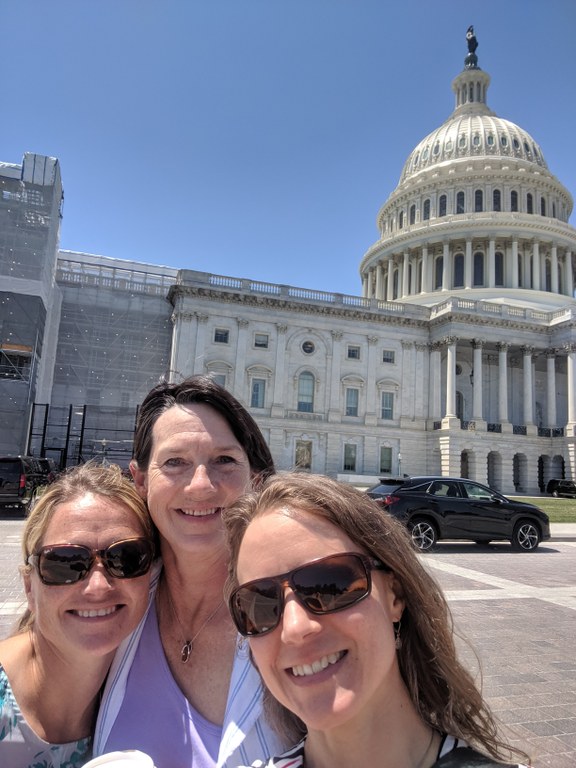
EMBA's Yvonne Kraus, BCHW's Kathy Young and WTA's Andrea Imler snap a photo in front of the U.S. Capitol Building.
Last week, WTA’s advocacy director Andrea Imler journeyed to the other Washington with leaders of two other state outdoor recreation organizations, Kathy Young of Back Country Horsemen of Washington (BCHW) and Yvonne Kraus of Evergreen Mountain Bike Alliance (EMBA). The three women all represent different trail user groups — hikers, mountain bikers and equestrians — but were there for the same reason: to speak up in support of public lands and trails.
Three different organizations, one Shared purpose
WTA, EMBA and BCHW have long-standing partnerships. Yes, each wants trails that our users can recreate on, but, more importantly, we all want sustainable trails and access to public lands for everyone.
“Evergreen and WTA’s collaboration on trail planning, trail maintenance, recreation initiatives, and advocacy for public land protection and recreation policy and funding goes back more than two decades,” said Yvonne. “In recent years, we have worked together more closely to ensure a robust policy and funding environment for trails in our state and to showcase a strong partnership approach to recreation investments in our fast-growing state, balanced with simultaneous habitat and resource protection and restoration efforts.”
Kathy added in an important personal perspective too. “I think outsiders tend to put our recreational interests into silos, not understanding that I am not exclusively an equestrian,” she said. “I ride bikes, and hike and backpack. I enjoy being a tourist in national parks and national monuments.”
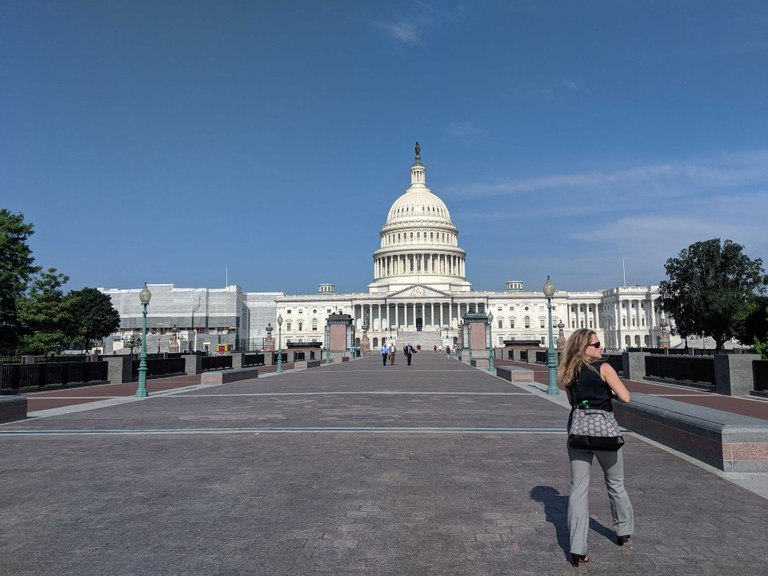
EMBA's Yvonne Kraus between meetings.
It’s evident when you look at the visions of both BCHW (dedicated to keeping trails open for all users; educating horse users in Leave-No-Trace practices; and providing volunteer service to resource agencies) and EMBA (to create, maintain, and protect sustainable mountain biking opportunities in Washington) that there would be an abundance of overlap with that of WTA’s vision (trails for everyone, forever).
As Yvonne explained, “when we can overcome a few differences in our organization’s missions, but find our common goals and share these with our leaders, we solve issues for them.”
Indeed, all three organizations share a common goal: as more and more people look to recreate on Washington’s public lands, land management agencies need to have the funding (at both the state and federal level) they require to maintain trail infrastructure and access.
Talking trails With Policy-Makers
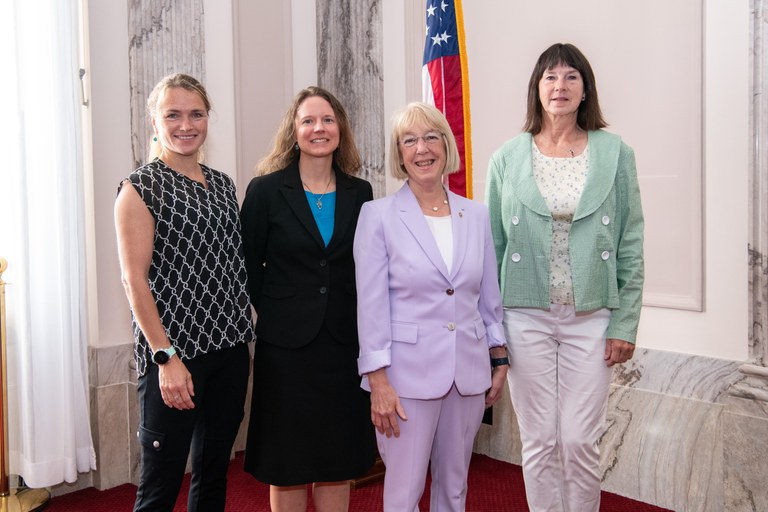
EMBA's Kraus, WTA's Imler, Sen. Patty Murray and BCHW's Young met in Washington DC.
This was a huge reason behind our joint trip to Washington, D.C. As WTA’s Imler put it, all three organizations wanted to convey the need for “trails as a ‘must-have’ rather than a ‘like-to-have’.”
While there, we met with six of Washington’s Representatives, our state’s two Senators to advocate for fully funding both the Forest Service and our National Park Service. Our state and federal land management agencies are underfunded and face recreation and maintenance backlogs in excess of $900 million. So, we asked our policy-makers to show support for the Restore Our Parks Act, which would "establish, fund, and provide for the use of amounts in a National Park Service Legacy Restoration Fund to address the maintenance backlog of the National Park Service, and for other purposes." We also met with recreation and trails staff for the United States Forest Service headquarters in D.C. to talk about how important Washington's national forests are for recreation.
“We spoke up for continued trail and outdoor recreation facility funding and encouraged legislators to support the Forest Service at a time that fires, decimated forest health and poor condition of access road to trailheads is threatening even more closures over the next decade,” said Yvonne.
We also took time to thank Washington’s state's entire delegation for championing the recently-passed public lands package (the John D. Dingell, Jr. Conservation, Management, and Recreation Act), which included permanent authorization for Land and Water Conservation Fund (LWCF). Sen. Maria Cantwell in particular worked tirelessly to get this bill passed.
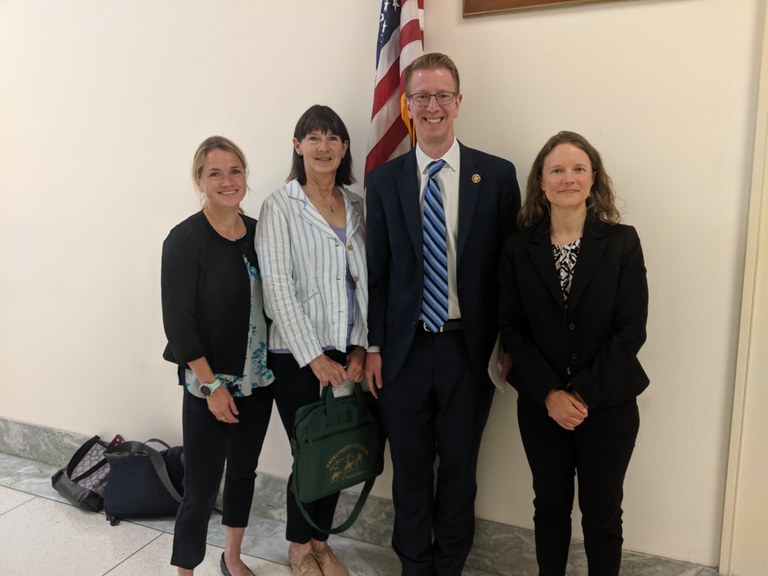
EMBA's Krauss, BCHW's Young, Rep. Kilmer (WA-6) and WTA's Imler. Rep. Kilmer said he was interviewed recently and asked what his favorite website was; he said wta.org!
In every meeting, we highlighted the impact of trails and recreation on the local economy. Outdoor recreation generates 201,000 direct jobs and $21.6 billion consumer spending in our state. A just-released report by the National Park Service shows that in 2018, 8.4 million park visitors spent an estimated $506 million in local gateway regions while visiting national park lands in Washington. That translates to support for 5,830 jobs and $670 million in economic output in the Washington economy.
Data like this helps lawmakers prioritize our public lands when making budget and policy decisions, and WTA, BCHW and EMBA made sure they heard this loud and clear.
“As a group, I believe we have a better ability to show that we stand together for trails,” said Kathy. “Certainly we have differences, but by coming together we show that we are willing to have dialogue, help and support each other when and where we can and expect our legislators and agencies to do the same.”
WTA, EMBA and BCHW Teach trail users how to share the trail
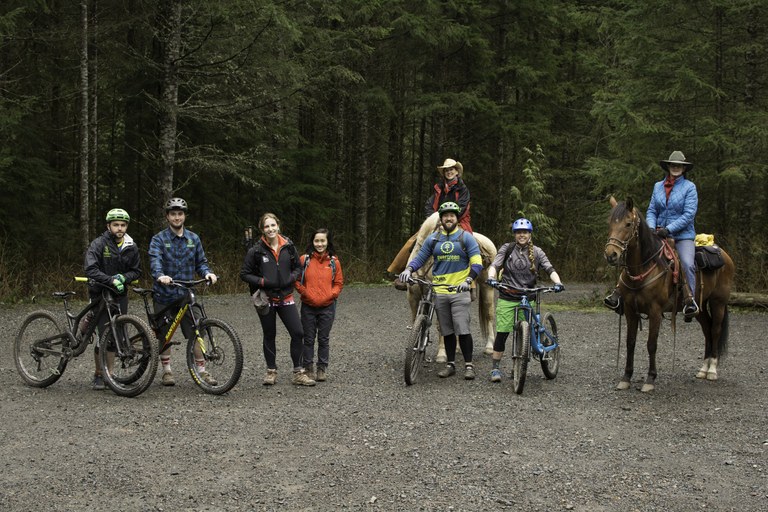
Besides collaborating on state and federal advocacy, and in the field for trail work, our organizations also meet on trail to make sure that the spirit of our partnership creates a more positive trail culture for all trail users.
“In 2017, two brave equestrians jumped on our mountain bikes, and two (intimidated) mountain bikers opted to mount a real steed. WTA filmed this occasion at Tiger Mountain and produced a short video about the rules of a multi-use trail, to ensure a pleasant outdoor experience for all.”
Watch the video, test your trail smarts and see the spirit of collaboration hard at work.


Comments